After victory in Raqqa over IS, Kurds face tricky peace
Kurdish groups working hard to give Arabs role in Raqqa but city falls outside Kurdish-dominated regions of north
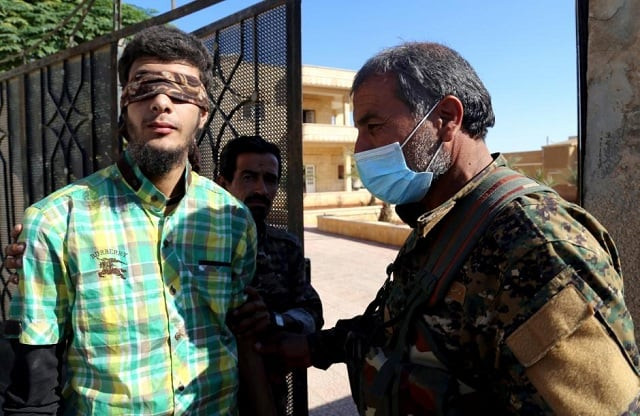
Members of Syrian Democratic Forces escort a blindfolded civilian detainee suspected to be a member of Islamic State militants in Raqqa,
Photo: REUTERS
Kurdish groups who led the fight against Islamic State in its former capital Raqqa must navigate a complex peace to avoid ethnic tension with the city's Arab majority and to secure critical US aid.
The Kurdish-dominated Syrian Democratic Forces (SDF) which finally vanquished Islamic State in Raqqa on Tuesday face the big task of rebuilding a city left in ruins by months of intense fighting and heavy air strikes by the US led coalition. The political challenge is no less daunting in a city that falls outside the Kurdish-dominated regions of northern Syria.
The fall of Raqqa, where Islamic State staged euphoric parades after its string of lightning victories in 2014, is a potent symbol of the terrorist movement's collapsing fortunes. Its self-declared 'caliphate' is also crumbling fast in eastern Syria, helping President Bashar al-Assad and his Iranian and Russian allies to recapture swathes of territory. Keenly aware of Raqqa's ethnic and tribal sensitivities, the SDF has been working hard to put Arabs at the heart of plans for local government and policing post-Islamic State rule, analysts say.
Swiss man's Jack Daniel's flag mistaken for that of Islamic State
In the short term, the Raqqa Civil Council (RCC) set up under SDF auspices must urgently provide security, repair infrastructure and supply aid to win the backing of a population exhausted by conflict, and to allow the people of Raqqa to return home. Longer term, Raqqa's political destiny is tied to the wider fate of the war that has shattered Syria into a patchwork of areas over the last six years, including swathes of the north controlled by the Kurdish YPG militia that leads the SDF.
Ultimately, the Syrian state wants to recover control of this city on the Euphrates River, meaning it may eventually become the arena of a new conflict with Damascus, or a bargaining chip in eventual negotiations over possible Kurdish autonomy. "Whoever leads us, Kurd or Arab, we want them to provide us with services," said a man from Raqqa, speaking outside the RCC headquarters in Ain Issa, north of the city. "Safety and security is the most important thing," said the man, a government employee before the war who cited lingering fear of the Syrian state as his reason for staying anonymous.
'Federal' Future?
Raqqa was not a target for the YPG earlier in the war but gradually became one as the militia emerged as the main Syrian partner for the US led coalition. The US led coalition says Arab fighters battling under the SDF banner made up the bulk of the force in the Raqqa campaign. But Kurdish commanders and fighters of the well-organised YPG appeared the leading force throughout the four-month campaign.
Syria's main Kurdish party, the PYD, and its allies may hope Raqqa will eventually join a new "federal" system of autonomous regions they are establishing in the north. But Kurdish leaders say it is too early to discuss that for now, underlining local and international sensitivities surrounding the political project opposed by their US allies and neighbouring Turkey.
'Khilafat is coming': Islamic State flag put up on Islamabad's main thoroughfare
While Syrian Kurds say they want to remain part of Syria, regional concern over Kurdish separatism has deepened since Iraqi Kurds voted for independence, triggering military action by Iraq and tough measures by Turkey and Iran. Turkey, in particular, views rising Syrian Kurdish power at its border as a threat to its security, and unsuccessfully pressed Washington to abandon its alliance with the YPG in the run up to the Raqqa attack.
Turkey plays host to a rival Raqqa civil council which regards the YPG as a foreign occupation force. Kurdish politicians say Raqqa's future is now entirely in the hands of its people. "So far we have not seen any reactions to indicate there will not be acceptance of the SDF, or the RCC," said Fawza Youssef, a senior Kurdish politician, in an interview. "The ones who will remain in Raqqa will be the internal security forces and the RCC," she said. "The security forces that are being prepared are all volunteers from Raqqa." Some YPG fighters quickly began pulling back from the city on Tuesday, handing their positions to non-Kurdish elements of the SDF, a witness and field commanders said.
Risk of 'Covert Interference'
The SDF applied a similar model in the northern Syrian city of Manbij last year after capturing it from Islamic State. "The (RCC) is still closely linked with YPG/PYD power structures, but they have put more time and effort into emphasising inclusivity than we have seen in some other areas," senior International Crisis Group analyst Noah Bonsey said. But the risk of unrest would rise if Kurdish groups were perceived to be micro-managing the city.
The United States has deployed a team of diplomats to Syria to work on humanitarian and stabilisation efforts. The US State Department said Washington would take the lead in helping to clear rubble and restore basic services. "We will assist and take, essentially, the lead in bringing back the water, electricity and all of that," State Department spokeswoman Heather Nauert told a briefing. "But eventually the governance of the country of Syria is something that I think all nations remain very interested in."
Mia Khalifa says Islamic State threatening to behead her
But analysts question how long US support will last. A US official involved in post-Raqqa planning said that the United States would not support "the PYD project to make an autonomous administration".
For example, the official said schools could only get aid if they were teaching a variant of the Syrian state curriculum, rather than an entirely new one. "We're not going to support a separatist entity ... that's cut and dry," the official said.
A Syrian government official forecast trouble ahead for the SDF in Raqqa and other Arab majority areas of Syria. "There is a contradiction," said one Syrian official, speaking on condition of anonymity. "The manpower is with the Arabs, but the military power is with the Kurds."

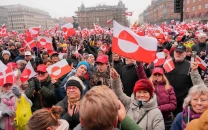
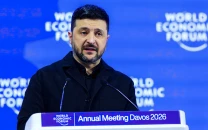

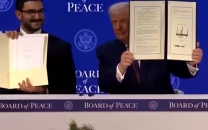
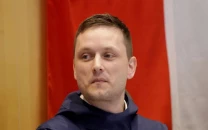
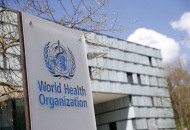












COMMENTS
Comments are moderated and generally will be posted if they are on-topic and not abusive.
For more information, please see our Comments FAQ